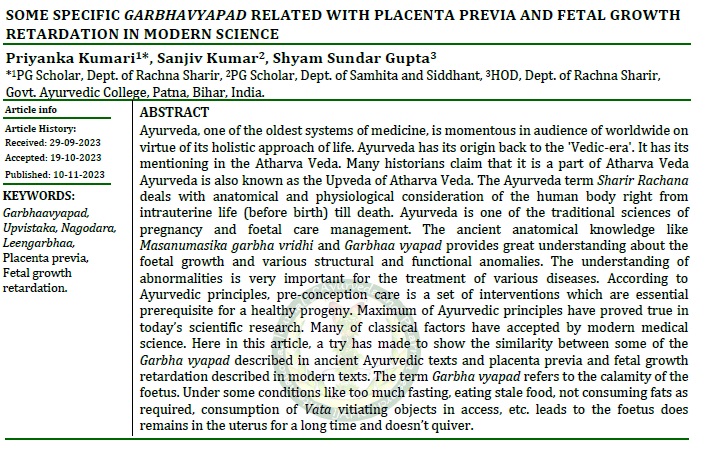Some Specific Garbhavyapad Related with Placenta Previa and Fetal Growth Retardation in Modern Science
DOI:
https://doi.org/10.47070/ijapr.v11i10.2957Keywords:
Garbhaavyapad, Upvistaka, Nagodara, Leengarbhaa, Placenta previa, Fetal growth retardationAbstract
Ayurveda, one of the oldest systems of medicine, is momentous in audience of worldwide on virtue of its holistic approach of life. Ayurveda has its origin back to the 'Vedic-era'. It has its mentioning in the Atharva Veda. Many historians claim that it is a part of Atharva Veda Ayurveda is also known as the Upveda of Atharva Veda. The Ayurveda term Sharir Rachana deals with anatomical and physiological consideration of the human body right from intrauterine life (before birth) till death. Ayurveda is one of the traditional sciences of pregnancy and foetal care management. The ancient anatomical knowledge like Masanumasika garbha vridhi and Garbhaa vyapad provides great understanding about the foetal growth and various structural and functional anomalies. The understanding of abnormalities is very important for the treatment of various diseases. According to Ayurvedic principles, pre-conception care is a set of interventions which are essential prerequisite for a healthy progeny. Maximum of Ayurvedic principles have proved true in today’s scientific research. Many of classical factors have accepted by modern medical science. Here in this article, a try has made to show the similarity between some of the Garbha vyapad described in ancient Ayurvedic texts and placenta previa and fetal growth retardation described in modern texts. The term Garbha vyapad refers to the calamity of the foetus. Under some conditions like too much fasting, eating stale food, not consuming fats as required, consumption of Vata vitiating objects in access, etc. leads to the foetus does remains in the uterus for a long time and doesn’t quiver.
Downloads




